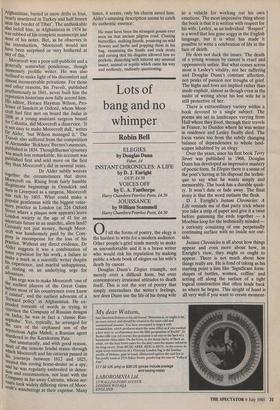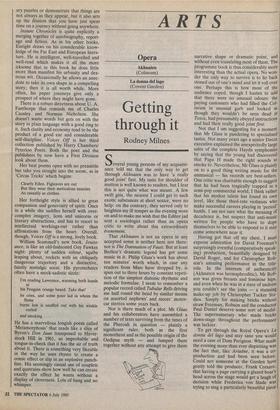Lots of bang and no whimper
Robin Bell
ELEGIES by Douglas Dunn
Faber, £4
INSTANT CHRONICLES: A LIFE by D. J. Enright
OUP, £4.50
VOICES OFF by U. A. Fanthorpe
Harry ChambersIPeterloo Poets, £4.50
JOUISSANCE by William Scanunell
Harry ChamberslPeterloo Poets, £4.50
0 f all the forms of poetry, the elegy is the hardest to write for a modern audience. Other people's grief tends merely to make us uncomfortable and it is a brave writer who would risk his reputation by making public a whole book of elegies on his wife's death by cancer.
Douglas Dunn's Elegies triumph, not merely over a difficult form, but over contemporary irrational attitudes to death itself. This is not the sort of poetry that simply externalises the writer's feelings, nor does Dunn use the life of his dying wife as a vehicle for working out his own emotions. The most impressive thing about the book is that it is written with respect for his wife, Lesley, as an individual. 'Respect'• is a word that has gone soggy in the English language, but it is what has made it possible to write a celebration of life in the face of death.
He does not duck the issues. The death of a young woman by cancer is cruel and oppressively unfair. But what comes across most is Lesley's vitality, not her suffering and Douglas Dunn's constant affection, not peaks of passion nor troughs of grief. The highs and lows are implied rather than made explicit, almost as though even in the midst of writing about his lost wife he is still protective of her.
There is extraordinary variety within a book devoted to a single subject. The poems are set in landscapes varying from Hull where they lived, through their travels in France, to Dundee where he was writer in residence and Lesley finally died. The focus varies too from the subtly changing balance of dependencies to whole land- scapes inhabited by an elegy.
Over the years, since his first book Terry Street was published in 1968, Douglas Dunn has developed an impressive mastery of poetic form. In Elegies there is a sense of the poet's having at his disposal the techni- que to say what he wants simply and memorably. The book has a durable quali- ty. It won't date or fade away. The final irony is that the word outlasts the flesh.
D. J. Enright's Instant Chronicles: A Life reminds me of that party trick where you take a strip of paper and give it a twist before gumming the ends together — a Moebius loop for the technically minded — a curiosity consisting of one perpetually continuing surface with no inside nor out- side.
Instant Chronicles is all about how things appear and even more about how, in Enright's view, they might or ought to appear. There is not much about how things really are. He is fond of taking as his starting point a line like 'Significant form: shapes of bottles, women, coffins' and setting off along the surface of a tight logical construction that often leads back to where he began. This sleight of hand is all very well if you want to create moment- ary puzzles or demonstrate that things are not always as they appear, but it also sets up the illusion that you have just spent time on a journey without going anywhere.
Instant Chronicles is quite explicitly a merging together of autobiography, report- age and fiction. As in his other books, Enright draws on his considerable know- ledge of the Far East and European litera- ture. He is intelligent, well-travelled and well-read which makes it all the more irksome that in this book he does little more than manifest his urbanity and dex- trous wit. Occasionally he allows an anec- dote to take its own shape as a compelling story; then it is all worth while. More often, his paper journeys give only a prospect of where they might have gone.
There is a robust directness about U. A. Fanthorpe that reminds me of Charles Causley and Norman Nicholson. She doesn't waste words but gets on with the story in plain language with a good ring to it. Such clarity and economy tend to be the product of a good ear and considerable self-discipline. Voices Off is her third collection published by Harry Chambers/ Peterloo Poets. Both the poet and the publishers by now have a First Division look about them.
Her best poems open with no preamble but take you straight into the scene, as in 'Circus Tricks' which begins:
Clearly Eden. Figleaves are out
But they wear their meticulous muscles As casually as clothes.
Her forthright style is allied to great compassion and generosity of spirit. Once in a while she saddles herself with over- complex imagery, lions and unicorns or literary abstractions, and has to resort to intellectual workings-out rather than affirmations from the heart. Overall, though, Voices Off is a strong, lively book.
William Scammell's new book, Jouiss- ance, is like an old-fashioned Guy Fawkes night: plenty of sudden colour, squibs leaping about, rockets with an obliquely dangerous trajectory and a distinctive, faintly nostalgic scent. His pyrotechnics often have a mock-sadistic sizzle:
I'm reading Lawrence, warming both hands at
his Penguin orange beard. Take that! he cries, and some poor lad in whom the flame
burns low is snuffed out with his winkle curled and smoking . .
He has a marvellous longish poem called 'Metamorphosis' that reads like a slice of Byron's Don Juan transposed to Haver- stock Hill in 1961, so improbable and tongue-in-cheek that it has the air of truth about it. There is something very likeable in the way he uses rhyme to create a comic effect or slip in an explosive punch- line. His seemingly casual use of couplets and quatrains show how well he can create exactly the effect he wants without a display of cleverness. Lots of bang and no whimper.



















































 Previous page
Previous page